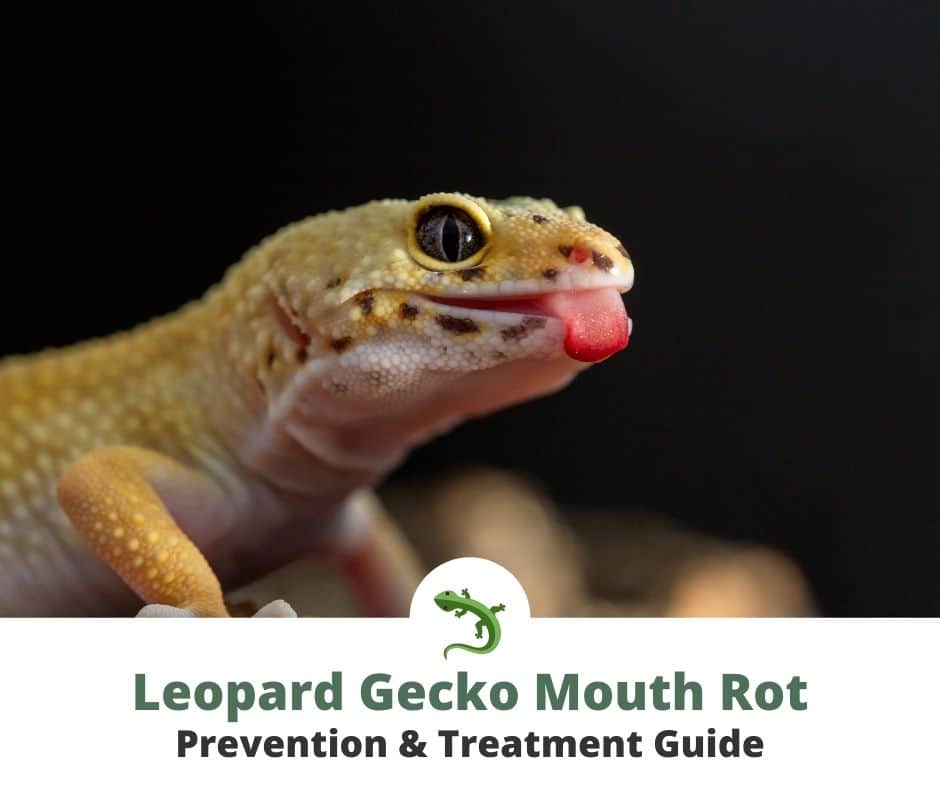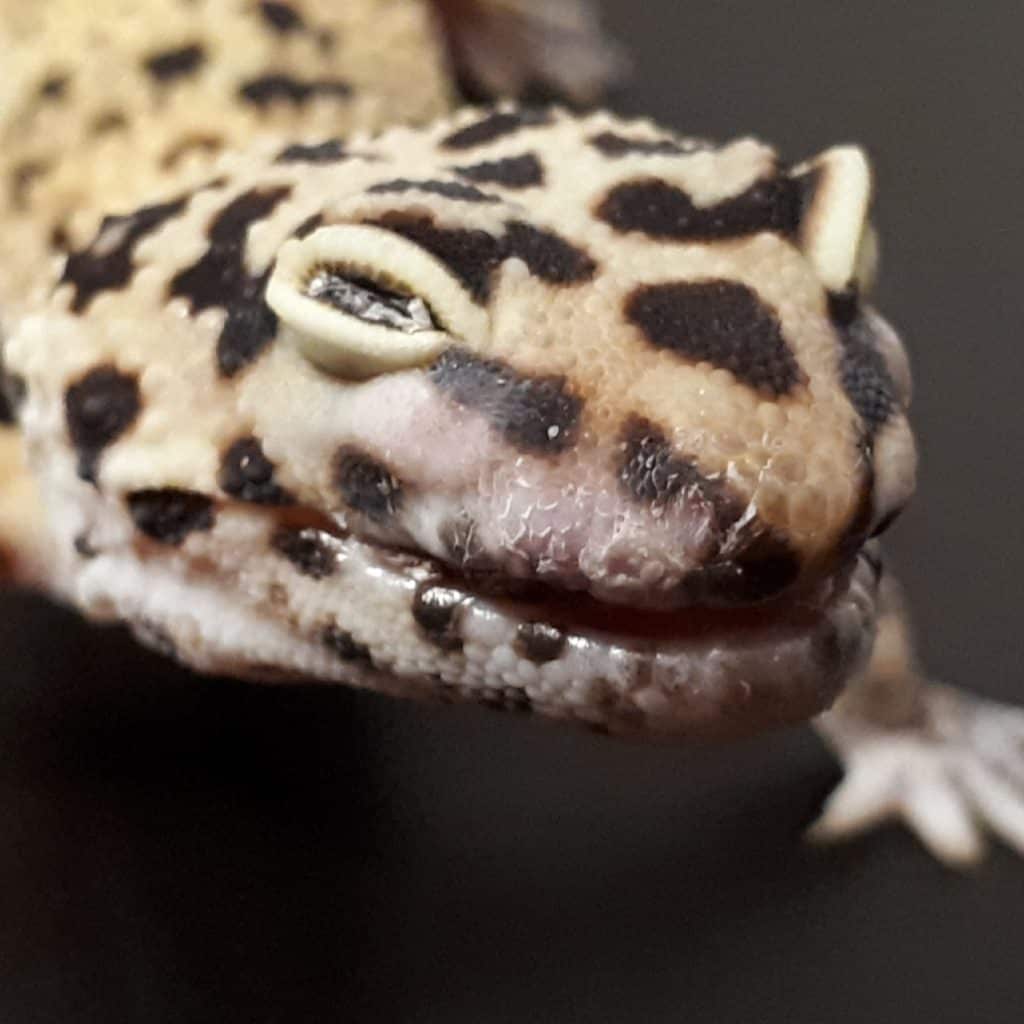Mouth rot in Leopard geckos can be deadly if left untreated. It’s important to catch it early and begin treatment immediately as prescribed by a Veterinarian.
In this guide, you’ll learn:
- What is mouth rot?
- What are the early signs?
- How can mouth rot be cured?

What Is Mouth Rot In Leopard Geckos?
Mouth rot, also known as canker or stomatitis, is the inflammation or infection of the tissue in a reptile’s mouth. In advanced cases, the tissue can become necrotic. If the infection causes a discharge near the glottis or throat, the condition can lead to respiratory diseases and other issues with the digestive tract.

Mouth rot is often caused by the anatomy of your Leopard gecko’s mouth, poor diet, and a lowered immune system caused by an underlying health issue. Health issues afflict reptiles mostly due to poor husbandry or improper enclosure conditions.
The best prevention against mouth rot would be to keep your Leopard gecko healthy and in good shape by giving it a good, healthy diet, proper nutrition, and a clean environment with the correct conditions.
What Are The Early Signs Of Mouth Rot In Leopard Geckos?
It’s good practice to check your Leopard gecko’s mouth from time to time to make sure everything looks healthy. If there are small cuts, stuck food, any abscess or pus, or signs of irritation, then you should check for other signs of mouth rot.
To do this, you can repeatedly but softly stroke at the top of their mouth which will force them to open it so you can check their teeth and gums.
An early sign could be a refusal to eat and slight inflammation or swelling around the head or mouth.
How Can You Cure Mouth Rot In Your Leopard Gecko?
Important
If you suspect a possible case of mouth rot in your Leopard gecko, you must see an exotic Vet as soon as possible. Only antibiotics prescribed by a Vet can cure mouth rot.
Treatment of mouth rot is usually through a course of antibiotics and thorough cleaning administered by a veterinarian. Surgical removal of mouth tissue with advanced damage might be necessary in some cases.
While your gecko is recovering, fluid therapy might be prescribed if it cannot eat solid food. Increased nutritional supplements such as multivitamins may also be prescribed.
In most cases, prevention of mouth rot is infinitely better than cure, so ensure that all the needs to keep your Leopard gecko healthy are met to ensure its good oral health. Regular checking of its mouth for any cuts and injuries will also help.
What Causes Mouth Rot In Leopard Geckos?
- Inappropriate diet
A diet that includes soft food such as fruit and canned goods is detrimental to Leopard geckos, insectivores. The sugars on these foods can lead to gum and teeth diseases and the lack of abrasion usually given by the hard exoskeleton of insects can lead to a build-up of plaque. Plaque, gum, and tooth disease can be a precursor to mouth rot.
📚 Read More >> Reasons Why Your Leopard Gecko Won’t Eat
- Lowered immune system
A lowered immune system slows down the healing capabilities of your Leopard gecko’s body making it susceptible to diseases such as mouth rot. Without antibodies to fight off bacteria or other viral infections, small injuries in your gecko’s mouth can worsen and progress to mouth rot.
A suppressed immune system can change the bacterial population in your gecko’s mouth from gram-positive flora to gram-negative populations (e.g. Pseudomonas, Aeromonas, Citrobacter, E. Coli, and Salmonella). These bacteria can quickly become invasive if the body cannot fight them making small injuries from accidents and bite wounds from live prey worse than they normally would be.
A lowered immune system is usually caused by poor living conditions (wrong temperatures, poor heating, and an unclean tank) and stress. Stress can be brought on by excessive handling or other health issues.
- Poor husbandry or inappropriate enclosure conditions
Improper habitat conditions such as the wrong temperature and humidity and poor hygiene can lead to different health complications for your Leopard gecko. This usually leads to a lowered immune system and other illnesses that can stress your Leopard gecko making it difficult to fight off an infection.
A hide or a small shelter in its enclosure can also help your gecko by providing it a place to hide and feel safe during times of stress.
- Injury
Small injuries from live feed can afflict your gecko’s mouth so checking for any signs of cuts or abrasions from time to time can help prevent mouth rot. These injuries, when left untreated can become infected leading to mouth rot.
- Vitamin A deficiency
Vitamin A deficiency in Leopard geckos has been linked to the accumulation of metaplastic epithelium or abnormal growth in the oral glands resulting in distension (swelling) of the glands and ducts. This affects the mouth and leads to secondary infections that can cause mouth rot. At early stages, this can be treated with removal of the debris and dietary improvement but in severe cases, surgery is required.
📚 Read More >> Leopard Gecko Tail Rot
What Are The Symptoms Of Mouth Rot In Leopard Geckos
- Lack of appetite
Mouth rot is often uncomfortable due to the swelling or the infected tissue. This leads to a lack of appetite in geckos as feeding can become painful for them. Always monitor your Leopard gecko’s feeding habits so you can notice any changes immediately. It’s also good to check their mouth once in a while for any injuries.
- Visible inflammation
Swelling of the gums, mouth, face, or any part of your gecko’s head can indicate mouth rot. Pay attention to red, inflamed gums or mouth tissue especially those surrounding their teeth.
- Pus or other fluids
Secretion of pus or any foul-smelling fluids from the mouth is a definitive sign of mouth rot. Pus can also come from their nose or saliva.
- Plaque
Yellow plaque on the gums or mouth of your gecko can indicate the onset of mouth rot. Make sure your gecko gets enough insects with hard exoskeletons such as crickets so the abrasive action as they eat them can help lessen plaque build-up.
- Dead tissue and a foul smell
Dead tissue inside your gecko’s mouth with a foul smell is a sign of mouth rot. At this point, a trip to the vet is best so they can quickly administer an antibiotic treatment.
When Should You See A Vet?
It’s easy to misuse antibiotics or antiseptics and cause more harm while trying to clean out your pet’s mouth rot so in this case, it’s best to see a vet immediately once you spot signs or symptoms. This ensures that you get the correct prescription and your vet can explain how to clean your lizard’s mouth to help it recover.
Conclusion
Mouth rot can become a serious condition that can turn fatal when left untreated. It usually stems from a poor diet and a suppressed immune system due to poor husbandry that prevents the gecko’s body from effectively fighting off bacterial infection.
Prevention is usually better than cure so make sure you keep your Leopard gecko in good health. In most cases of mouth rot, a trip to the vet is best so the proper course of antibiotics can be administered and your gecko’s mouth can be cleaned.
FAQs
Can Mouth Rot Kill Your Leopard Gecko?
Yes, if mouth rot is left untreated, it can kill your Leopard gecko.
How do I know if my leopard gecko has mouth rot?
Inflammation, redness, pus, a foul smell, or dead tissue on its mouth, gums, or teeth in addition to the loss of appetite are symptoms of mouth rot.
Can you treat mouth rot at home?
To a certain extent, yes, by using antibiotics but it’s best to have your Leopard gecko treated by a veterinarian or an exotic animal specialist to prevent further damage and to ensure your pet is getting the proper care. It’s often easy to misuse medication especially with smaller animals like Leopard geckos.
Further reading
Overview on Leopard geckos:
ADW: Eublepharis macularius: INFORMATION
Management and care of Leopard geckos:
MANAGEMENT, CARE, AND COMMON CONDITIONS OF LEOPARD GECKOS
A detailed study on Leopard geckos:
Natural history and biology of hobbyist choice leopard gecko Eublepharis macularius
Short article on care:
Leopard Gecko Husbandry and Nutrition
Helpful books about reptiles:
Handbook of Exotic Pet Medicine
Reptile Medicine and Surgery in Clinical Practice | Wiley Online Books


